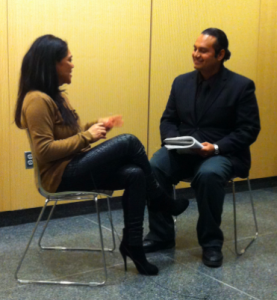by Kelvin Sherman
 Recently, N.A.H.J., La Voz, and La L.U.C.H.A hosted journalist Sandra Guzman. Guzman is an Emmy Award-winning journalist with more than 10 years experience in broadcast, newspaper, and magazine journalism. She is the former editor-in-chief of Latina magazine, author of The New Latina’s Bible, and controversial former editor of the New York Post. Sandra is currently the editor-in-chief of her magazine, Heart and Soul; a magazine that talks about wellness for colored woman. She is also currently working on the HBO series: The Latino List.
Recently, N.A.H.J., La Voz, and La L.U.C.H.A hosted journalist Sandra Guzman. Guzman is an Emmy Award-winning journalist with more than 10 years experience in broadcast, newspaper, and magazine journalism. She is the former editor-in-chief of Latina magazine, author of The New Latina’s Bible, and controversial former editor of the New York Post. Sandra is currently the editor-in-chief of her magazine, Heart and Soul; a magazine that talks about wellness for colored woman. She is also currently working on the HBO series: The Latino List.
The lecture was amazing! Sandra talked about how she got her start in the world of journalism and how it takes persistence and going the extra mile to be successful in this competitive field. She also talked about the struggle of being a Latina in America and called for diversity in newsrooms across America. “ Minorities make up about 12% in news room . Not enough of us making decisions, so its up to us to get the story out there.” She applauded journalists who are getting out there in the news, whether they are Black, White, Latino, and .etc.
At the conclusion of her lecture she answered several questions from the audience and one really stuck out to me. Someone asked what was her opinion about Geraldo Rivera’s comments on the Trayvon Martin case. “Geraldo Rivera’s comments shows how out of touch he is with today’s youth.” She alluded to afros in the 70’s and how they were stereotyped to be the look of rebellious Black people. She also called for justice in the case and for Trayvon Martin’s family. I had a question of my own and attempted to weasel out details of her pending lawsuit against News Corporations the “New York Post” and the paper’s editor-in-chief Col Allan for harassment as well as “unlawful employment practices and retaliation.” She declined to give any details about it because its still ongoing, but instead she said the lesson is speak out against racism and agreed to come back to talk to me about it once it was over. I will definitely hold her to that!





